‘TeamMakers’ Help Kids Reach for the Stars
By Laura Robb and Evan Robb
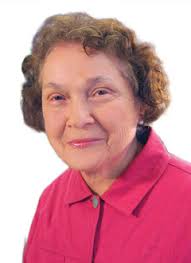 In fifth grade Helena (Laura’s granddaughter and Evan’s niece) cherished being able to choose books for independent and instructional reading. Her reading notebook revealed the wide-range of genres and topics she had explored.
In fifth grade Helena (Laura’s granddaughter and Evan’s niece) cherished being able to choose books for independent and instructional reading. Her reading notebook revealed the wide-range of genres and topics she had explored.
Helena’s enthusiasm for reading continued during the summer prior to sixth grade, and once or twice a week, Helena spent time browsing through her grandma’s extensive library. After each visit, she left with a stack of poetry and picture books and lots of nonfiction, her favorite genre.

Students could choose to read books over computer work, but the prizes for meeting goals on the computer weren’t offered for reading real books. For sixth graders, the choice was clear—the computer program and rewards won!
Finally, in March, over dinner at my house Helena said to Evan and Laura, “I’m reading books now. I don’t care about prizes; the stuff on the computer is boring, and I hate answering dumb questions.”
We praised her decision and encouraged her to find books to read at the public library near her house. We heard no more complaints until the last day of school. Helena was going to cook dinner with Laura for her older brother Lucas. After Helena walked from the school bus stop to Laura’s house, they sat at the kitchen table sipping tall glasses of lemonade.
“How was your last day?’ Laura asked.
“I’ve been thinking about school this year,“ Helena said, as she bit into a chocolate macaroon. She paused for more lemonade. “I figured out that this year school was like eating and a week later you forget what you ate. At school you bite and chew the words and ideas and then you throw them up on a test. Two months later you forget what you memorized.”
Something’s Wrong with This Picture
Evan (a middle school principal) and Laura (a literacy consultant) agree that too many schools around the country still focus on having students memorize information and then evaluating their recall with quizzes and tests. But in this age of technology where information can be accessed immediately, the question to ask is, Should students spend time memorizing facts or using the facts to think and problem solve?
We see the need for a shift from a teacher-centered model to a student-centered approach. To replace the culture of memorize-and-test, we believe students should be developing their ability to interact with a team, communicate their analytical thinking in writing and conversations, and tap into their creativity and explore new ways of approaching and solving problems.
However, we recognize that for teachers to change their instructional patterns and become student-centered they need:
- A principal who learns with them, joins study groups, and believes in a student-centered approach.
- Guidance in helping students develop agency and take charge of their learning.
- Administrators who value taking risks for changing instruction and view failure as good information for reflection and making adjustments.
- Opportunities to observe student-centered classes.
- A literacy coach who supports teachers by planning lessons together, teaming during lessons, debriefing to celebrate progress, and then negotiating goals.
The timeline for shifting to a student-centered approach varies among teachers and depends on their background knowledge, willingness to take risks, curiosity, their desire to improve, and the level of support they have. However, there are two things we are sure of: (1) teachers need the gift of time to change; and (2) the amount of time they need varies.
It’s important to note that changes in technology, unlike changes in teaching, are rapid. A decade ago the powerful smart phones you use today were just being hinted at. The first viable browsers emerged in the late 1990s. The first personal computers arrived forty years ago. Compare them to the handheld devices you use today.
Information technology’s rate of growth is exponential, while education’s growth rate is linear and recursive. So what does this mean for teachers and students? It means that teachers need to look at new and different ways to learn and teach as they prepare their students for a rapidly changing world that isn’t likely to slow down.
Top 10 Skills Students Need for 2020
The year 2020 is right around the corner. Every year there will be major advances in robotics, artificial intelligence, biotechnology, and genomics—advances that will transform the way we live and work. Some jobs will disappear while others that don’t exist today will replace them.
One point is a sure thing: jobs during 2020 and beyond will demand specific skills of students—skills that call for a shift in how and what students learn. In 2016, the World Economic Forum ranked the ten skills today’s students will need to be prepared to meet the challenges of 2020 and beyond.
- Complex Problem Solving
- Critical Thinking
- Creativity
- People Management
- Coordinating with Others
- Emotional Intelligence
- Judgment and Decision Making
- Service Orientation
- Negotiation
- Cognitive Flexibility
If school districts in every corner of our country collaborate and dialogue with teachers, staff, and students, they can identify the changes needed in their districts to develop these 10 skills.
There are no quick fixes or magic bullets to help you reach them but there are models of schools that are well on their way. Ongoing, building level, and district-wide professional learning to develop skilled teachers who have the background knowledge to respond to diverse learning levels takes time, but it’s the best solution.
In addition, we recommend schools review the way they schedule classes. For example, those schools that have seven 42-minute class periods a day won’t have enough time for students to develop these 10 skills. Research and discover a contemporary block schedule that works for your schools and creates chunks of time for projects, demonstrations, making, and group interaction.
4 Ways to Make Meaningful Change
The big question facing many schools is, What can we do to create meaningful change? Consider the four suggestions that follow.
Redefine Roles
It’s time to re-evaluate “I’ve always done it that way” and reflect on what you can do to prepare students for their future. We see intentional risk-taking and creative thinking as tools to help you cope with the challenges schools face today and the unknowns they’ll meet in the future.
Continual collaboration among central office, school administrators, teachers and staff is a first step to forging relationships and collaborating for change. We hope central office administrators will schedule in-depth visits to classrooms to feel the pulse of schools and connect with staff.
We envision district-wide teams pooling their expertise and dreams to make substantive changes. Change defines our world, and it’s schools’ responsibility to prepare teachers and students to evolve and grow into creative problem solvers and global citizens.
Become an Evolving Educator
Open your mind and heart to change and avoid relying on the past and what worked for you. Take risks. Be creative. Innovate. Work as a district-wide team and use the 10 skills all students need for 2020 and beyond as your focusing tool for meaningful change. It won’t happen overnight. But if you keep waiting for tomorrow, it might not happen.
The time is now. Make the decision to become #teammakers who communicate and think-out-of-the-box to transform schools into learning centers filled with teachers and administrators who have this common goal: to prepare students for their tomorrows.
Foster Teacher Agency

Agency can lead to teacher advocacy: teacher-leaders who collaborate to effect changes in schedules, organize professional learning, and create support networks for students who require interventions such as extra help, re-teaching, and/or learning with a knowledgeable peer partner.
Flip Meetings
Teachers who experience student-centered learning can better understand the why behind moving to that approach. To help teachers actively learn in the ways their students should learn, we recommend flipping team, department, and/or faculty meetings. During this time, administrators and teachers read professional materials and experience collaborative group discussions, inquiry-based learning and research, reading, writing, and planning multi-media projects. Change comes faster when the learning is active and becomes part of teachers’ educational DNA!
Look Back to Move Forward
Rediscover the child deep in your memory and re-connect with the curiosity, wondering, and reach-for-the-stars dreams that were part of you. It’s dreams, stories, and wonderings that define us. We challenge you to use your creativity and imagination to encourage teamwork among all members of your school district.
Become a team member who collaborates to re-imagine and transform leadership, curriculum, and how students learn. The schools you and your team develop will become learning centers that guide and prepare students as they grow into the analytical thinkers and problem solvers the world needs.
Photos courtesy of the Alabama Best Practices Center
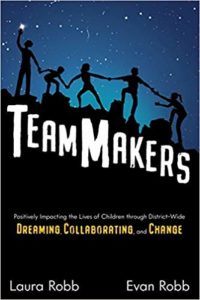
Evan is also the author of The 10-Minute Principal: Free Up Your Time to Focus on Leadership (Corwin, 2019). Laura’s latest of many solo books is Read, Talk, Write: 35 Lessons That Teach Students to Analyze Fiction and Nonfiction (Corwin, 2016). Follow Evan on Twitter @erobbprincipal and his mom @LRobbTeacher.

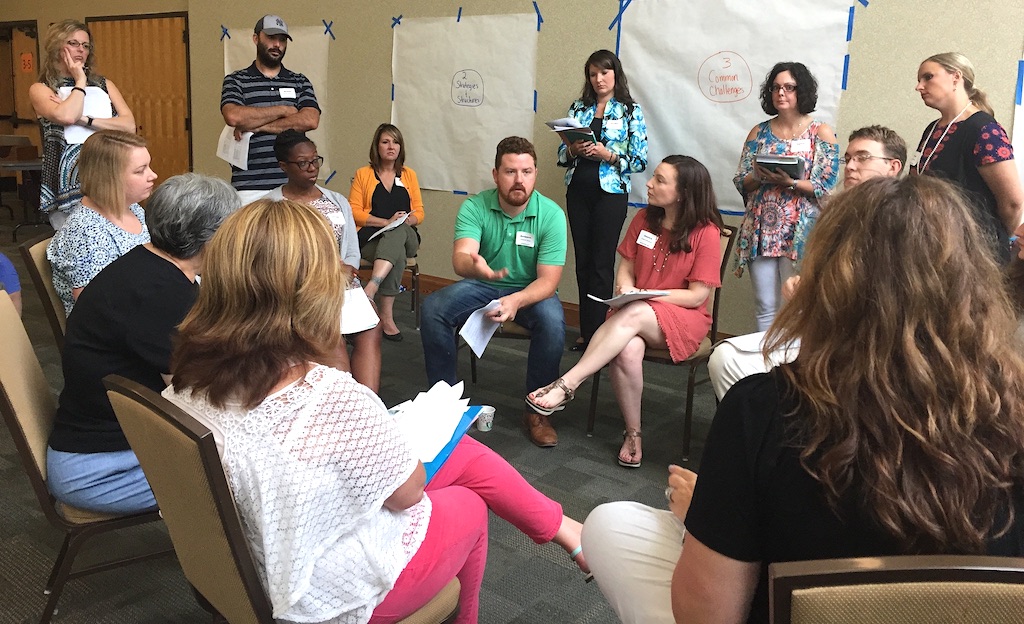
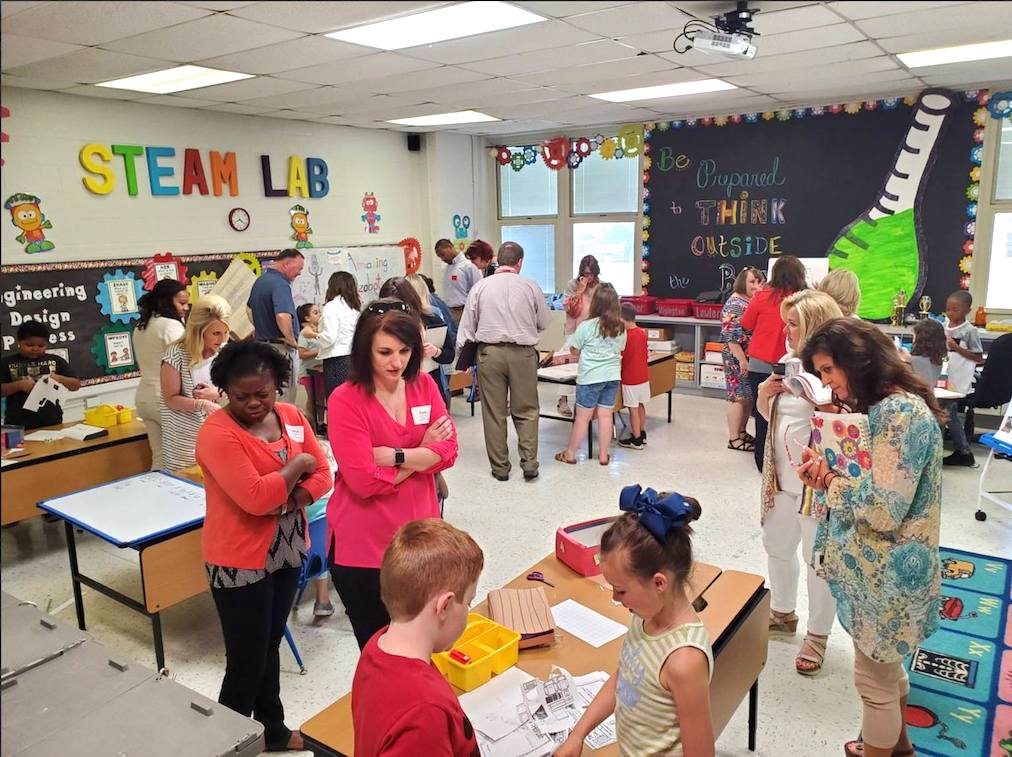


































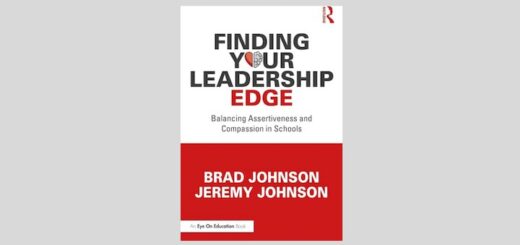
Great advice for invoking the systematic change that our students need! Well done!